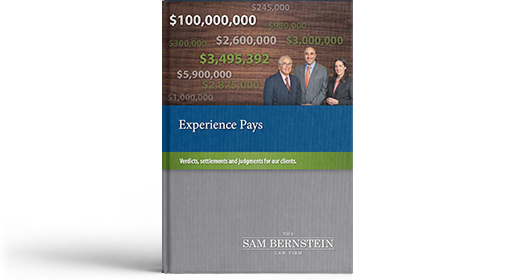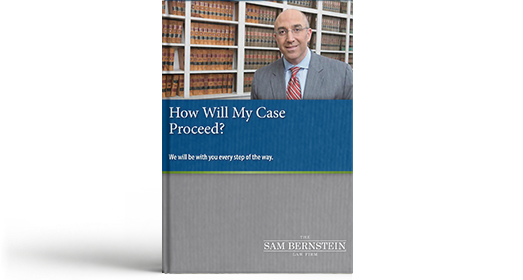WORKERS COMPENSATION LAWYERS
If you have suffered a work related injury, contact The Sam Bernstein Law Firm to get the compensation you deserve.
THE MICHIGAN WORKERS’ DISABILITY COMPENSATION ACT
Under the Michigan Workers’ Disability Compensation Act, almost all Michigan employers are required to carry workers’ compensation insurance to cover an employee who suffers an "injury arising out of and in the course of employment." A worker who is hurt on the job is entitled to benefits for wage loss, medical treatment, and rehabilitation services resulting from the injury, among other things. Unlike personal injury cases, there is no compensation awarded for pain and suffering in Michigan workers’ compensation.
With over 800 years of combined legal experience, we are Michigan's most experienced personal injury law firm. Our team of workers' compensation lawyers are ready to begin fighting for the compensation that you and your loved ones deserve. Contact us today for a free consultation with one of our workers' compensation lawyers!
EMPLOYEES WHO ARE ELIGIBLE FOR WORKERS’ COMPENSATION BENEFITS UNDER MICHIGAN LAW
Workers’ compensation insurance covers most Michigan workers. Workers who are not covered by Michigan law include:
- Federal employees, such as persons working for the U.S. Post Office, the Veterans Administration, or other federal government agencies. (These individuals may be covered by the Federal Employment Compensation Act (FECA))
- Some agricultural workers
- Employees of very small businesses, with no more than three employees
- Independent contractors
Ask your employer if the company has a Workers’ Compensation insurance policy that covers your injuries.
WHEN AM I ELIGIBLE FOR WAGE LOSS BENEFITS IN MICHIGAN?
In Michigan, there is not a distinction between temporary and permanent disability. Rather, you will receive compensation for wage loss, regardless of the permanency of your injury. You’re eligible for wage loss benefits as long as you have a reduction in your wage-earning capacity that’s work-related. Depending on the type of injury you suffered, you may be able to collect lifetime wage loss benefits.
If your doctor requires you to be off of work due to your work-related injury, you can start collecting wage benefits once you have been taken off of work for seven days. If your injury causes you to be off of work for 14 or more days, then you can also collect wage benefits for the first seven days you were off work.
HOW MUCH WILL I RECEIVE IN WAGE LOSS BENEFITS?
The amount of wage loss benefits you will receive is 80% of your regular after-tax wages. Under state law, you may be subject to maximum or minimum benefit amounts depending on your wage rate. This will also depend on the number of dependents you have.
Additionally, you can receive wage loss benefits if you have returned to work, but in a lower-earning role. In this case, you are eligible to receive 80% of the difference between your usual (pre-injury) after-tax wages and your new wage rate.
NOTICE AND FILING REQUIREMENTS FOR WORKERS’ COMPENSATION CLAIMS
If you suffer a work-related injury, it is important to report the injury to your employer as soon as possible. Under Michigan law, you should provide notice of your injury to your employer within 90 days of the injury.
The workers’ compensation claim filing requirements are a bit different. Michigan law requires that a workers’ compensation claim must be filed within two years of the date of injury, or two years from the date that the injury manifests itself.
In order to ensure that you meet the filing and procedural requirements of a workers’ compensation claim in Michigan, it is a good idea to retain the services of an experienced workers’ compensation attorney, such as one of our lawyers. We can help you navigate the complex area of workers’ compensation law to help you fight for the compensation you deserve.
MORE INFORMATION ON WORKERS' COMPENSATION:
WAGE LOSS BENEFITS
Under Michigan law, workers’ compensation wage loss benefits are 80% of the after-tax value of your average weekly wage.
There are complicated features that impact the calculation of wage loss benefits. When a worker’s weekly salary varies from week to week, wage loss benefits are based on the average of the 39 highest pay weeks in the last 52 weeks.
If an injured worker returns to work part-time, or at a lower-paying job, that individual may still be eligible for partial wage loss benefits, to cover part of the difference between the amount he or she earned before and after the work-related injury.
These formulas can be complex. Contact us if you have questions about whether you are getting the correct amount of wage loss benefits.
MEDICAL BILL BENEFITS
Workers’ compensation pays for all medical care that is reasonable and necessary for treatment of a work-related injury for as long as the worker requires treatment. Thus, a worker with a serious or chronic injury may be eligible for these medical benefits for years, or even for the rest of his or her life.
Disputes may arise about what is reasonable and necessary treatment. If this happens to you, contact us immediately.
HOW LONG AFTER AN ACCIDENT CAN I BRING A CLAIM?
THE INJURY THAT OCCURRED WAS MY EMPLOYER’S FAULT. CAN I SUE MY EMPLOYER FOR MY PAIN AND SUFFERING?
Generally, Michigan law prohibits employees from suing their employers for damages beyond the economic benefits provided by workers’ compensation. However, you may be able to take legal action against the manufacturer of a defective product or against an individual (other than a co-worker) who caused the injury.
I BELIEVE THAT MY INJURY RESULTED FROM A VIOLATION OF MY CIVIL RIGHTS. CAN I SUE MY EMPLOYER IN THIS SITUATION?
Maybe. In the workers’ compensation law, there are exceptions to the general rule that prevent an individual from seeking non-economic damages from an employer. One exception is a civil rights violation; another is an injury that directly results from an intentional act by the employer.
I WAS INJURED WHILE ON MY WAY INTO WORK. AM I ELIGIBLE FOR WORKERS’ COMPENSATION BENEFITS?
Workers’ compensation usually does not apply to one who is traveling to and from the place of employment. However, once a worker is on the employer’s property, workers’ compensation insurance may cover an injury.
It is important to note that employees who must travel to perform work assignments are covered by workers’ compensation benefits if they are hurt on the job. For example, a person who is injured after leaving the worksite to make a delivery or attend a meeting at another location may qualify for workers’ compensation because the trip was an essential part of his or her job assignment.
On the other hand, workers’ compensation may not cover an injury if the employee was hurt while making a side-trip to handle purely personal business.
MY CO-WORKER AND I WERE GOOFING AROUND WHEN I WAS INJURED. AM I STILL ENTITLED TO MAKE A CLAIM FOR WORKERS’ COMPENSATION BENEFITS?
Michigan courts traditionally recognize that employees may engage in a certain amount of "horseplay." In most cases, this would still qualify an individual for workers’ compensation benefits. However, each case must be evaluated separately, based on the specific circumstances. A worker who engaged in serious willful or intentional misconduct may lose the right to workers compensation benefits.
MY EMPLOYER OFFERED ME A DIFFERENT TYPE OF JOB, BUT I FEEL THAT IT IS BENEATH MY PREVIOUS PRE-INJURY POSITION. DO I HAVE TO ACCEPT THE POSITION?
Michigan law requires injured employees to accept a position offered by their own employers (or other employment sources), if the new job is within their qualifications and training, and any medical restrictions. When the new job pays less than the previous position, the worker should receive partial wage loss benefits, to cover part of the difference between the individual’s previous and current earnings.
A worker seriously risks any claim for continued workers’ compensation benefits by turning down the offer of a job that he or she is able to do. If you are not sure how to handle a job offer or your employer demands that you actively look for other work, consult an attorney immediately.
WHAT HAPPENS IF I TRY TO RETURN TO WORK IN A JOB THAT IS SUPPOSED TO BE WITHIN MY MEDICAL RESTRICTIONS, BUT CANNOT PERFORM THE JOB DUTIES?
Under the law, it should be possible for you to resume receiving benefits. However, your employer may challenge whether you made a real effort to return to work. If this happens to you and you truly are unable to work, you should talk with a workers’ compensation lawyer immediately.
CAN I CHOOSE MY OWN DOCTOR WHEN I AM GETTING TREATMENT FOR MY WORK-RELATED INJURY?
For the first 10 days after a work-related injury, the employer has the right to choose the treating doctor. However, after 10 days, the law allows you to select your own doctor and other medical care providers, as long as you select qualified medical professionals and notify your employer of your intentions.
If you or a loved one have suffered a workplace injury, it is important to talk with an experienced attorney as soon as possible.
Client reviews

"THEY KEPT ME UPDATED."
- Veronica, Actual Client

"I WILL BE FOREVER GRATEFUL."
- Tim, Actual Client

"I FELT LIKE I WAS A PART OF THE FAMILY"
- Terrence, Actual Client

"VERY PROFESSIONAL & KNOWLEDGEABLE"
- Sherry, Actual Client

"PASSIONATE, COMPETENT, COMMITTED"
- Actual Client

"THEY STAND BY THEIR WORD."
- Actual Client

"KIND & COMPASSIONATE"
- Nancy, Actual Client

"YOU CAN TRUST THEM 100%."
- Michael, Actual Client

"HONEST, CARING, SUPPORTIVE."
- Janice, Actual Client

"THEY TOOK PERSONAL INTEREST IN ME."
- Janice, Actual Client

"I KNEW I WAS IN GOOD HANDS"
- Jerry, Actual Client

"NUMBER ONE PERSON I'D RECOMMEND."
- Actual Client

"SAM'S GOT YOU COVERED."
- Chris, Actual Client



